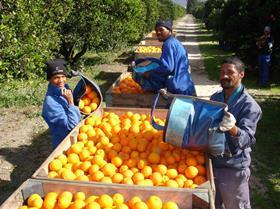
Initial estimates suggest the South African national transport workers' strike could have cost the country more than R7bn.
The strike caused severe disruption in the country's container terminals, while conventional reefer terminals operated smoothly throughout the strike.
South Africa's Minister of Agriculture, Tina Joemat-Pettersson, estimated the losses for the citrus industry at R640m.
'Some have speculated that this amount may have been overstated,' said the Citrus Growers Association (CGA) in its weekly update. 'If you consider the full duration and aftermath period, this estimation may not be too far off.'
Meanwhile the transport authority, Transnet, said the backlog caused by the strike is expected to last up to six weeks. According to the CGA, Cape Town and Port Elizabeth should be able to recover container operations much quicker than the Durban container terminal, with reports claiming 22 vessels were outside the port waiting to berth while eight container vessels were working at the terminal and Pier 1.
Perishable Products Export Control Board figures indicate there has been a severe reduction in containerised exports to Canada, Asia, the Mediterranean and Far East. The figures show that, compared to week 19, container exports to the Far East declined by 70 per cent during week 20.
'This therefore suggests that we should prioritise citrus that is in storage waiting to be loaded for these markets or where containers have been stuffed and are at depots or in container terminals waiting to be loaded on ships,' said the CGA, and the body added there had been a sharp increase in specialised reefer shipments to Europe and Middle East.
The CGA also said it appears there had been a 30 per cent reduction of exports to Europe so far this season, but that this should change with the accelerated reefer shipments expected during the next few weeks.
The association has now joined the calls for a better balance between container and specialised reefer shipments from South Africa, after what it calls ‘being caught between a rock and hard place'.
With the strike now over, the industry is casting its eyes forward to possible disruption during the FIFA World Cup after a world cup road closure trial run was conducted in Durban on 28 May.
'The N2 (highway) was completely closed off and traffic was diverted to alternate routes while the backlog was being cleared. Let's keep our fingers crossed that during the world cup measures would have been implemented to prevent this,' the CGA said.



